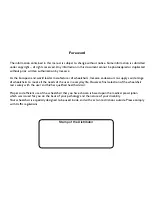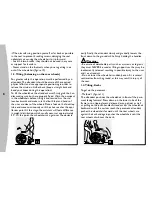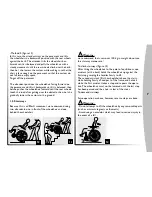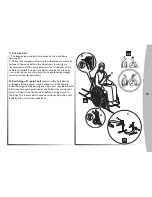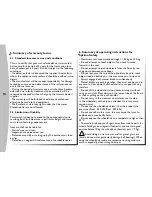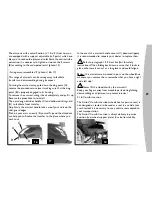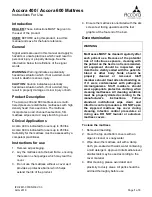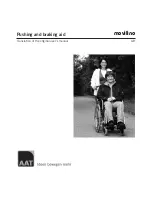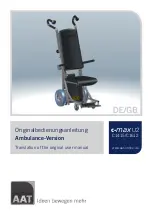
8
9
-
With the other hand, push on the seat tube until the
upholstery is fully extended and seat tube sits in receiver.
-
Then, engage the two manual brakes, open the footrest/
legrest and check the ground clearance (footrest/ground
distance - see paragraph B-2.1.4). You can now sit down in
the wheelchair.
2.1.2
Folding the chair (figures 19 & 20) :
-
Fold and lock the footrest/legrest toward the front of the
wheelchair.
-
Swivel the plates into the vertical position. Using both
hands, take the centre front and back edges of the seat
upholstery and lift it. Or, tilt the wheelchair to one side
and close it using the handles on the backrest.
!
Warning :
- Fold the wheelchair while keeping the seat upholstery
upwards to avoid damage by the folding system.
- Caution possible finger pinch.
2.2. Wheelchair propulsion
Self propelling wheelchair propulsion is achieved through the
use of the handrims mounted on the wheels.
The distance between the wheels axle position and the seat
height can be adjusted to allow you to hold the handrims
properly, and various accessories can be added to improve
the grip (anti-slip plastic coated, etc.). Qualified medical and
paramedical staff will be able to provide you with advice
regarding the propulsion which is best adapted to your
disability. Any wheels adjustments to the set up of your
wheelchair (see paragraph 2.2.2) should only be performed
at the direction of a competent person who has fully risk
assessed the implication of any changes to the wheelchair
configuration.
2.3. Lifting the wheelchair
First folds the chair (see paragraph 2.12), always lift the
wheelchair by gripping the frame at the points (A) shown in
the figure 21.
!
Never lift the wheelchair by removable parts (armsrest,
footrests). Ensure the backrest posts are securely in place.
19
20
A
21


